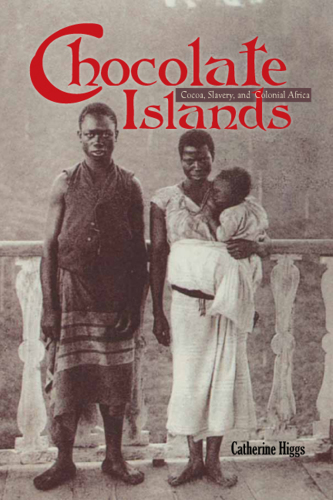
Chocolate Islands
Cocoa, Slavery, and Colonial Africa
کتاب های مرتبط
- اطلاعات
- نقد و بررسی
- دیدگاه کاربران
نقد و بررسی

November 1, 2012
Cadbury Brothers, the world-renowned chocolatiers, imported more than 50 percent of their chocolate from the Portuguese West African colony Sao Tome and Principe, the titular chocolate islands, at the beginning of the 20th century. When rumors reached William Cadbury in England that these islands were using slave labor to harvest the cocoa, Cadbury sent Joseph Burtt to investigate the labor practices there and then travel onward to Angola, Mozambique, and Transvaal in South Africa from 1905 to 1907. Higgs (history, Univ. of Tennessee, Knoxville; "The Ghost of Equality: The Public Lives of D.D.T. Jabavu of South Africa") re-creates Burtt's journeys through exhaustive research and a remarkable eye for detail. Burtt concluded that the workers on Sao Tome and Principe were indeed slaves, and from 1908 to 1909, he and Cadbury traveled to Principe, Sao Tome, and Angola so Cadbury could observe the situation firsthand. Upon their return, Cadbury and the other British chocolatiers boycotted all further imports. VERDICT A fine, detailed work about the intersection of chocolate and slavery in the first decade of the 20th century. Collections that already have Carol Off's "Bitter Chocolate" or Lowell J. Satre's "Chocolate on Trial" should have this as well; recommended for all serious readers on its subjects.--Margaret Atwater-Singer, Univ. of Evansville Libs., IN
Copyright 2012 Library Journal, LLC Used with permission.

August 1, 2012
Englishman Joseph Burtt was hired by the chocolate merchants Cadbury Brothers Ltd. to travel through Africa in the early 1900s to confirm that chocolate purchased from the firm's vendors in the Portuguese West African colonies was not produced by slave labor. The Cadburys were Quakers, whose beliefs would not permit them to profit from slave labor. Though they were astute businessmen, they stuck with principles that demanded that their workers were fairly treated. Higgs examines how Burtt, subject to the mores of the time, went about his investigation, traveling for two years on the islands of Sao Tome and Principe as well as Angola and Mozambique, chronicling the mistreatment of black workers. Though they were not, strictly speaking, slaves, their contracts left them little alternative to backbreaking work on cocoa plantations. Burtt's investigation came at a time of scandal surrounding the working conditions of many colonial enterprises, including mines, and resulted in some labor reforms. Higgs offers a well-researched examination of the dynamics of race, labor, and colonialism in the early part of the twentieth century.(Reprinted with permission of Booklist, copyright 2012, American Library Association.)

























دیدگاه کاربران